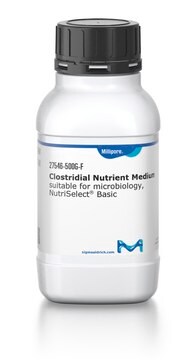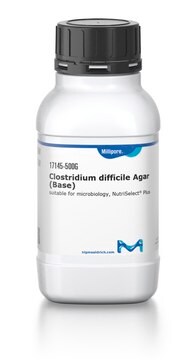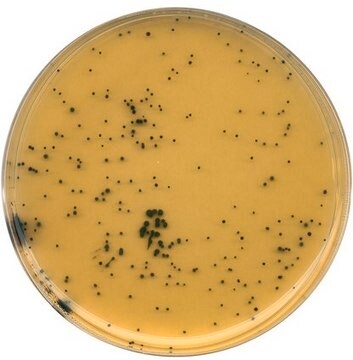1.11699
Differential reinforced clostridial broth (DRCM)
GranuCult®, suitable for microbiology, for Clostridium spp.
Synonym(s):
Clostridium differential broth, DRCM
About This Item
Recommended Products
form
medium granules (dehydrated (DCM))
Quality Level
packaging
pkg of 500 g
manufacturer/tradename
GranuCult®
storage condition
dry media (Keep tightly closed)
technique(s)
microbiological culture: suitable
color
brown
pH
7.0-7.2 (25 °C, 28 g/L in H2O, after autoclaving)
solubility
27.5 g/L
bulk density
650 kg/m3
application(s)
food and beverages
microbiology
storage temp.
15-25°C
suitability
Clostridium spp.
Related Categories
General description
Application
Features and Benefits
- GranuCult® offers superior granulated culture media
- Safe and sustainable due to reduced risks associated with fine dust and toxic substance inhalation, resulting in a safer work environment
- Excellent wettability, solubility, and free-flowing properties
- Convenient, with minimal component separation and clumping, even under warm or humid conditions
- High batch-to-batch reproducibility
- Prolonged shelf life of up to five years
- High number of test strains exceeding all regulatory demands
- Granulation technology allows many supplements to be included, with no need to add these separately
Analysis Note
Appearance (colour): reddish-brown
pH-value (25 °C): 6.9 - 7.3
Growth (Escherichia coli ATCC 25922 (WDCM 00013)): good to very good
Growth (Bacillus cereus ATCC 11778 (WDCM 00001)): fair to good
Growth (Pseudomonas aeruginosa ATCC 27853 (WDCM 00025)): poor to fair
Growth (Clostridium bifermentans ATCC 19299): good to very good
Growth (Clostridium perfringens ATCC 13124 (WDCM 00007)): good to very good
Growth (Clostridium perfringens ATCC 10543): good to very good
Growth (Clostridium sporogenes ATCC 11437): good to very good
Growth (Clostridium sporogenes ATCC 19404 (WDCM 00008)): good to very good
Blacking (Escherichia coli ATCC 25922 (WDCM 00013)): -
Blacking (Bacillus cereus ATCC 11778 (WDCM 00001)): -
Blacking (Pseudomonas aeruginosa ATCC 27853 (WDCM 00025)): -
Blacking (Clostridium bifermentans ATCC 19299): +
Blacking (Clostridium perfringens ATCC 13124 (WDCM 00007)): +
Blacking (Clostridium perfringens ATCC 10543): +
Blacking (Clostridium sporogenes ATCC 11437): +
Blacking (Clostridium sporogenes ATCC 19404 (WDCM 00008)): +
Incubation: 7 days; 30 °C; layered with paraffin.
Footnote
The designations basic, plus, or prime are added to indicate the quality control level, from basic quality control to standard QC plus to prime for full regulatory compliance.
Legal Information
related product
Signal Word
Warning
Hazard Statements
Precautionary Statements
Hazard Classifications
Eye Irrit. 2
Storage Class Code
11 - Combustible Solids
WGK
WGK 3
Certificates of Analysis (COA)
Search for Certificates of Analysis (COA) by entering the products Lot/Batch Number. Lot and Batch Numbers can be found on a product’s label following the words ‘Lot’ or ‘Batch’.
Already Own This Product?
Find documentation for the products that you have recently purchased in the Document Library.
Our team of scientists has experience in all areas of research including Life Science, Material Science, Chemical Synthesis, Chromatography, Analytical and many others.
Contact Technical Service






